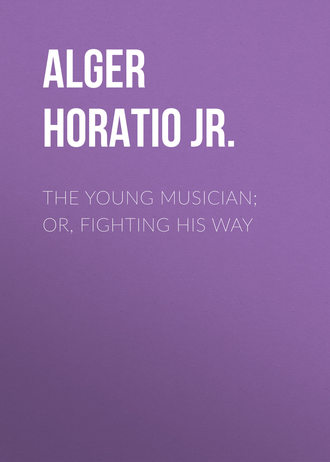
The Young Musician; Or, Fighting His Way
“What do you think, Andrew?” he said. “Paul Beck’s in the hall, as mad as a hatter, and he vows he’ll play himself. He says he was engaged, and no one shall take his place.”
Andrew Blake looked disturbed, and Philip shared in his feeling. Was he to lose his engagement, after all?
CHAPTER XXII. RIVAL MUSICIANS
They entered the hall, which was already well filled, for the young people of both sexes liked to have as long a time for enjoyment as possible.
At the head of the hall, in the center of a group, stood a tall, thin man, dressed in solemn black, with a violin under his arm. His face, which looked like that of a sick man, was marked by an angry expression, and this, indeed, was his feeling.
“I suppose that’s Mr. Beck?” said Philip.
“Yes, it is,” answered Andrew Blake, in evident discomposure. “What on earth brings him here from a sick-bed, I can’t understand. I heard that he had a fever.”
The fact was that Paul Beck was jealous of his reputation as a musician. It was satisfactory to him to think that he was so indispensable that no one could take his place. He had sent word to the committee that he should be unable to play for them, supposing, of course, that they would be compelled to give up the party. When intelligence was brought to him during the afternoon that it would come off, and that another musician had been engaged in his place, he was not only disturbed, but angry, though, of course, the latter feeling was wholly unreasonable. He determined that he would be present, at any rate, no matter how unfit his sickness rendered him for the evening’s work. He resolved to have no rival, and to permit no one to take his place in his own town.
It did not seem to occur to Mr. Beck that, having formally declined the engagement on account of sickness, he had no claim whatever on the committee, and was, in fact, an interloper. It was in vain that his sister protested against his imprudence. (He was an old bachelor and his sister kept house for him.) He insisted on dressing himself and making his way to the hall, where, as was to be expected, his arrival produced considerable embarrassment.
Paul Beck stood in sullen impatience awaiting the arrival of his rival.
It so happened that no one had thought to mention to him that it was a boy. He was prepared to see a full-grown man.
Philip followed Andrew Blake up to the central group.
“Who is it, I say,” Mr. Beck was inquiring, “that engaged another musician to take my place?”
“No one, sir,” answered Andrew Blake firmly, for Mr. Beck’s unreasonableness provoked him. “I engaged a musician to play this evening, but it was not in your place, for you had sent us word that you could not appear.”
“Where is he, I say?” continued Paul Beck sourly.
“Here he is,” replied Blake, drawing toward our hero, who felt that he was placed in an awkward position.
“Why, he’s only a baby!” said Beck, surveying our hero contemptuously.
Philip’s cheek flushed, and he, too, began to feel angry.
“He isn’t as old as you are, Mr. Beck,” said Andrew Blake manfully, “but you’ll find he understands his business.”
“I certainly didn’t expect you to get a child in my place,” said Paul Beck scornfully.
“I suppose a musician may know how to play, if he isn’t sixty-five,” said Miss Maria Snod-grass, who had listened indignantly to Mr. Beck’s contemptuous remarks about our hero, whose cause she so enthusiastically championed.
Poor Mr. Beck! He was sensitive about his age, and nothing could have cut him more cruelly than this exaggeration of it. He was really fifty-five, and looked at least sixty, but he fondly flattered himself that he looked under fifty. “Sixty-five!” he repeated furiously. “Who says I am sixty-five?”
“Well, you look about that age,” said Maria, with malicious pleasure.
“I shall have to live a good many years before I am sixty,” said Paul Beck angrily. “But that’s either here nor there. You engaged me to play to-night, and I am ready to do it.”
Andrew Blake felt the difficulty of his position, but he did not mean to desert the boy-musician whom he had engaged.
“Mr. Beck,” said he, “we shall be glad to have you serve us on another occasion, but to-night Mr. Gray, here, is engaged. You gave up the engagement of your own accord, and that ended the matter, so far as you are concerned.”
“Do you refuse to let me play?” demanded Paul Beck, his pale cheek glowing with anger and mortification.
“You understand why,” answered Blake. “This young man is engaged, and we have no right to break the engagement.”
Philip, who had felt the embarrassment of his position, had meanwhile made up his mind what to do. The three dollars he expected to earn were important to him, but he didn’t care to make trouble. He did not doubt that his lodging and meals would be given him, and that would be something. Accordingly, he spoke:
“I have been engaged, it is true,” he said, “but if Mr. Beck wants to play I will resign my engagement and stay and hear him.”
“No, no!” exclaimed several—Mr. Blake and Miss Snodgrass being among them.
“Mr. Gray, you were regularly engaged,” said one of the committee.
“That’s true,” answered Philip, “and,” he couldn’t help adding, “I should be justified in insisting upon playing; but since Mr. Beck seems to feel so bad about it, I will give way to him.”
He spoke manfully, and there was no sign of weakness or submission about him. He asserted his rights, while he expressed his willingness to surrender them.
There was a little consultation among the committee. They were all disgusted with the conduct of Paul Beck, and were unwilling that he should triumph. At the same time, as they might need his services at some future time, they did not wish wholly to alienate him.
Finally, they announced their decision through Andrew Blake.
“We are not willing to accept Mr. Gray’s resignation wholly,” he said, “but we propose that he and Mr. Beck shall divide the evening’s work between them—each to receive half the usual compensation.”
There was considerable applause, for it seemed to be a suitable compromise, and would enable the company to compare the merits of the rival musicians.
“I agree,” said Philip promptly.
“What do you say, Mr. Beck?” asked Andrew Blake.
Now, while Paul Beck did not like to give up half the honor, he felt thoroughly convinced that Philip was only a beginner, and that he, as an experienced player, could easily eclipse him, and thus gain a triumph which would be very gratifying to his pride.
As for the compensation, to do him justice, he did not much care for that, being a man of very good means. He played more for glory than for pay—though he, of course, had no objection to receiving compensation.
“I have no objections,” he said. “If you want to give the boy a chance to practice a little, I am willing.”
Philip understood the sneer, and he secretly determined to do his best.
The committee was much pleased at the satisfactory conclusion of what had threatened to be a very troublesome dispute, and it was arranged, Philip consenting, that Mr. Beck should play first.
The old musician played, in a confident manner, a familiar dancing-tune, accompanying his playing with various contortions of the face and twistings of his figure, supposed to express feeling. It was a fair performance, but mechanical, and did not indicate anything but very ordinary talent. His time was good, and dancers always found his playing satisfactory.
When Paul Beck had completed his task, he looked about him complacently, as if to say, “Let the boy beat that if he can,” and sat down.
Philip had listened to Mr. Beck with attention. He was anxious to learn how powerful a rival he had to compete with. What he heard did not alarm him, but rather gave him confidence.
CHAPTER XXIII. AN HOUR OF TRIUMPH
When Paul rose and stood before this audience, violin in hand, he certainly presented quite a strong contrast to his rival.
Paul Beck, as we have already said, was a tall, thin, lantern-jawed man, clad in solemn black, his face of a sickly, sallow hue.
Philip was of fair height, for his age, with a bright, expressive face, his hair of a chestnut shade, and looking the very picture of boyish health. His very appearance made a pleasant impression upon those present.
“He’s a nice-looking boy,” thought more than one, “but he looks too young to know much about the violin.”
But when Philip began to play, there was general surprise. In a dancing-tune there was not much chance for the exhibition of talent, but his delicate touch and evident perfect mastery of his instrument were immediately apparent. In comparison, the playing of Paul Beck seemed wooden and mechanical.
There was a murmur of approbation, and when Philip had finished his first part of the program, he was saluted by hearty applause, which he acknowledged by a modest and graceful bow.
Paul Beck’s face, as his young rival proceeded in his playing, was an interesting study. He was very disagreeably surprised. He had made up his mind that Philip could not play at all, or, at any rate, would prove to be a mere tyro and bungler, and he could hardly believe his ears when he heard the sounds which Philip evoked from his violin.
In spite of his self-conceit, he secretly acknowledged that Philip even now was his superior, and in time would leave him so far behind that there could be no comparison between them.
It was not a pleasant discovery for a man who had prided himself for many years on his superiority as a musician. If it had been a man of established fame it would have been different, but to be compelled to yield the palm to an unknown boy, was certainly mortifying.
When he heard the applause that followed Philip’s performance, and remembered that none had been called forth by his own, he determined that he would not play again that evening. He did not like to risk the comparison which he was sure would be made between himself and Philip. So, when Andrew Blake came up to him and asked him to play for the next dance, he shook his head. “I don’t feel well enough,” he said “I thought I was stronger than I am.”
“Do you want the boy to play all the rest of the evening?”
“Yes; he plays very fairly,” said Beck, in a patronizing manner, which implied his own superiority.
“There can be no doubt about that,” said Andrew Blake, with emphasis, for he understood Mr. Beck’s meaning, and resented it as one of the warmest admirers of the boy-musician whom he had engaged.
But Paul Beck would not for the world have revealed his real opinion of Philip’s merits.
“Yes,” he continued, “he plays better than I expected. I guess you can get along with him.”
“How shall we arrange about the compensation, Mr. Beck?” asked Blake. “We ought in that case to give him more than half.”
“Oh, you can give him the whole,” answered Beck carelessly. “If I felt well enough to play, I would do my part, but I think it will be better for me to go home and go to bed.”
His decision was communicated to Philip, who felt impelled by politeness to express his regrets to Mr. Beck.
“I am sorry you don’t feel able to play, Mr. Beck,” he said politely.
“Oh, it’s of no consequence, as they’ve got some one to take my place,” returned Beck coldly.
“I should be glad to hear you play again,” continued Philip.
Paul Beck nodded slightly, but he felt too much mortified to reciprocate Philip’s friendly advances. Half an hour later he left the hall.
The dancers by no means regretted the change of arrangement. They evidently preferred the young musician to his elderly rival. The only one to express regret was Miss Maria Snodgrass.
“I declare it’s a shame Mr. Beck has given up,” she said. “I wanted you to dance with me, Mr. Gray. I am sure if you can dance as well as you can play, you would get along perfectly lovely. Now you’ve got to play, and can’t dance at all.”
“It isn’t leap-year, Maria,” said Jedidiah Burbank, in a jealous tone.
Miss Snodgrass turned upon him angrily:
“You needn’t put in your oar, Jedidiah Burbank!” she said. “I guess I know what I’m about. If it was leap-year fifty times over, I wouldn’t offer myself to you!”
And the young lady tossed her head in a very decided manner.
“Now don’t get mad, Maria!” implored Jedidiah, feeling that at the prompting of jealousy; he had put his foot in it. “I didn’t mean nothing.”
“Then you’d better say nothing next time,” retorted the young lady.
Meanwhile, Philip acknowledged the young lady’s politeness by a smile and a bow, assuring her that if it had been possible, it would have given him great pleasure to dance with her.
“If Mr. Burbank will play for me,” he said with a glance at the young man, “I shall be glad to dance.”
Miss Snodgrass burst out laughing.
“Jedidiah couldn’t play well enough for an old cow to dance by,” she said.
“There ain’t any old cows here,” said Jedidiah, vexed at being ridiculed.
“Well, there are some calves, anyway,” retorted Maria, laughing heartily.
Poor Jedidiah! It is to be feared that he will have a hard time when he becomes the husband of the fair Maria. She will undoubtedly be the head of the new matrimonial firm.
There was nothing further to mar the harmony of the evening. It had begun with indications of a storm, but the clouds had vanished, and when Mr. Beck left the hall, there was nothing left to disturb the enjoyment of those present.
The favorable opinions expressed when Philip commenced playing were repeated again and again, as the evening slipped away.
“I tell you, he’s a regular genius!” one enthusiastic admirer said to his companion. “Paul Beck can’t hold a candle to him.”
“That’s so. He’s smart, and no mistake.”
Poor Mr. Beck! It was fortunate he was unable to hear these comparisons made. He could not brook a rival near the throne, and had gone home in low spirits, feeling that he could never again hold his head as high as he had done.
When the dancing was over, there was a brief conference of the committee of management, the subject of which was soon made known.
Andrew Blake approached Philip and said:
“Mr. Gray, some of us would like to hear you play something else, if you are not tired—not a dancing-tune.”
“I shall be very happy to comply with your request,” answered Philip.
He spoke sincerely, for he saw that all were pleased with him, and it is gratifying to be appreciated.
He paused a moment in thought, and then began to play the “Carnival of Venice,” with variations. It had been taught him by his father, and he had played it so often that his execution was all that could be desired. The variations were of a showy and popular character, and very well adapted to impress an audience like that to which he was playing.
“Beautiful! Beautiful!” exclaimed the young ladies, while their partners pronounced it “tip-top” and “first-rate,” by which they probably meant very much the same thing.
“Oh, Mr. Gray!” exclaimed Miss Snodgrass fervently. “You play like a seraphim!”
“Thank you!” said Philip, smiling. “I never heard a seraphim play on the violin, but I am sure your remark is very complimentary.”
“I wish you could play like that, Jedidiah,” said Maria.
“I’ll learn to play, if you want me to,” said Mr. Burbank.
“Thank you! You’re very obliging,” said Maria; “but I won’t trouble you. You haven’t got a genius for it, like Mr. Gray.”
The evening was over at length, and again Philip was made the happy recipient of three dollars. His first week had certainly been unexpectedly prosperous.
“This is better than staying in the Norton Poorhouse!” he said to himself.
CHAPTER XXIV. LORENZO RICCABOCCA
Philip’s reputation as a musician was materially increased by his second night’s performance. To adopt a military term, he had crossed swords with the veteran fiddler, Paul Beck, and, in the opinion of all who heard both, had far surpassed him.
This was said openly to Philip by more than one; but he was modest, and had too much tact and good taste to openly agree with them. This modesty raised him higher in the opinion of his admirers.
He was invited by the Blakes to prolong his visit, but preferred to continue on his journey—though his plans were, necessarily, not clearly defined.
Andrew Blake carried him five miles on his way, and from that point our hero used the means of locomotion with which nature had supplied him.
Some six miles farther on there was a manufacturing town of considerable size, named Wilkesville, and it occurred to him that this would be a good place at which to pass the night.
Something might turn up for him there. He hardly knew what, but the two unexpected strokes of luck which he had had thus far encouraged him to think that a third might come to him.
Philip continued on his way—his small pack of clothing in one hand and his violin under his arm. Being in no especial hurry—for it was only the middle of the forenoon—he bethought himself to sit down and rest at the first convenient and inviting place.
He soon came to a large elm tree, which, with its spreading branches, offered a pleasant and grateful shade.
He threw himself down and lay back on the greensward, in pleasant contemplation, when he heard a gentle cough—as of one who wished to attract attention. Looking up he observed close at hand, a tall man, dressed in black, with long hair, which fell over his shirt collar and shoulders.
He wore a broad collar and black satin necktie, and his hair was parted in the middle. His appearance was certainly peculiar, and excited our hero’s curiosity.
“My young friend,” he said, “you have chosen a pleasant resting-place beneath this umbrageous monarch of the grove.” “Yes, sir,” answered Philip, wondering whether the stranger was a poet.
“May I also recline beneath it?” asked the newcomer.
“Certainly, sir. It is large enough to shelter us both.”
“Quite true; but I did not wish to intrude upon your meditations.”
“My meditations are not of much account,” answered Philip, laughing.
“I see you are modest. Am I right in supposing that yonder case contains a violin?”
“Yes, sir.”
“Then you are a musician?”
“A little of one,” replied Philip.
“May I ask—excuse my curiosity—if you play professionally?”
“Perhaps he may help me to an engagement,” thought our hero, and he said readily, “I do.”
“Indeed!” said the stranger, appearing pleased. “What style of music do you play?”
“For each of the last two evenings I have played for dancing-parties.”
“Alone?”
“Yes.”
“You do not confine yourself to dancing-music?”
“Oh, no! I prefer other kinds; but dancing-tunes seem most in demand, and I have my living to make.” The stranger seemed still more gratified.
“I am delighted to have met you, Mr.– Ahem!” he paused, and looked inquiringly at Philip.
“Gray.”
“Mr. Gray, I believe Providence has brought us together. I see you are surprised.”
Philip certainly did look puzzled, as he well might.
“I must explain myself more clearly. I am Professor Lorenzo Riccabocca, the famous elocutionist and dramatic reader.”
Philip bowed.
“Doubtless you have heard of me?” said the professor inquiringly.
“I have never lived in large places,” answered Philip, in some embarrassment, “or no doubt your name would be familiar to me.”
“To be sure, that must make a difference. For years,” said the professor, “I have given dramatic readings to crowded houses, and everywhere my merits have been conceded by the educated and refined.”
Philip could not help wondering how it happened in that case that the professor should look so seedy. A genius appreciated so highly ought to have brought in more gold and silver.
Perhaps Professor Riccabocca understood Philip’s expressive look, for he went to to say:
“The public has repaid me richly for the exercise of my talent; but, alas, my young friend, I must confess that I have no head for business. I invested my savings unwisely, and ascertained a month since that I had lost all.”
“That was a great pity!” said Philip sympathizingly.
“It was, indeed! It quite unmanned me!” said the professor, wiping away a tear. “I felt that all ambition was quite gone, and I was mad and sick. Indeed, only a week since I rose from a sick-bed. But Lorenzo is himself again!” he exclaimed, striking his breast energetically. “I will not succumb to Fate. I will again court the favor of the public, and this time I will take care of the ducats my admirers bestow upon me.”
“I should think that was a good plan,” said Philip.
“I will begin at once. Nearby is a town devoted to the mammon of trade, yet among its busy thousands there must be many that will appreciate the genius of Lorenzo Riccabocca.”
“I hope so,” answered Philip politely.
He could not help thinking that the professor was rather self-conceited, and he hardly thought it in good taste for him to refer so boastfully to his genius.
“I wish you, Mr. Gray, to assist me in my project,” continued the professor.
“How can I do so, sir?” inquired Philip.
“Let me tell you. I propose that we enter into a professional partnership, that we give an entertainment partly musical, partly dramatic. I will draw up a program, including some of my most humorous recitations and impersonations, while interspersed among them will be musical selections contributed by yourself. Do you comprehend?”
“Yes,” answered Philip, nodding.
“And what do you think of it?”
“I think well of it,” replied the boy-musician.
He did think well of it. It might not draw a large audience, this mixed entertainment, but it would surely pay something; and it would interfere with no plans of his own, for, in truth, he had none.
“Then you will cooperate with me?” said the professor.
“Yes, professor.”
“Give me your hand!” exclaimed Riccabocca dramatically. “Mr. Gray, it is a perfect bonanza of an idea. I may tell you, in confidence, I was always a genius for ideas. Might I ask a favor of you?”
“Certainly, sir.”
“Give me a touch of your quality. Let me hear you play.”
Philip drew his violin from its case and played for his new professional partner “The Carnival of Venice,” with variations—the same which had been received with so much favor the evening previous.
Professor Riccabocca listened attentively, and was evidently agreeably surprised. He was not a musician, but he saw that Philip was a much better player than he had anticipated, and this, of course, was likely to improve their chances of pecuniary success.
“You are a splendid performer,” he said enthusiastically. “You shall come out under my auspices and win fame. I predict for you a professional triumph.”
“Thank you,” said Philip, gratified by this tribute from a man of worldly experience. “I hope you will prove a true prophet.”
“And now, Mr. Gray, let us proceed on our way. We must get lodgings in Wilkesville, and make arrangements for our entertainment. I feel new courage, now that I have obtained so able a partner. Wilkesville little knows what is in store for her. We shall go, see, and conquer!”
An hour later Philip and his new partner entered Wilkesville.
CHAPTER XXV. A CHANGE OF NAME
Wilkesville was an inland city, of from fifteen to twenty thousand inhabitants.
As Philip and the professor passed along the principal street, they saw various stores of different kinds, with here and there a large, high, plain-looking structure, which they were told was used for the manufacture of shoes.
“Wilkesville will give us a large audience,” he said, in a tone of satisfaction.
“I hope so,” said our hero.
“Hope so? I know so!” said the professor confidently. “The town is full of young men, employed in shoe-making. They are fond of amusement, and they will gladly seize an opportunity of patronizing a first-class entertainment like ours.”
The professor’s reasoning seemed good, but logic sometimes fails, and Philip was not quite so sanguine. He said nothing, however, to dampen the ardor of his partner.
“Let me see,” said the professor, pausing, “yonder stands the Wilkesville Hotel. We had better put up there.”
It was a brick structure of considerable size, and seemed to have some pretensions to fashion.
“Do you know how much they charge?” asked Philip prudently.









